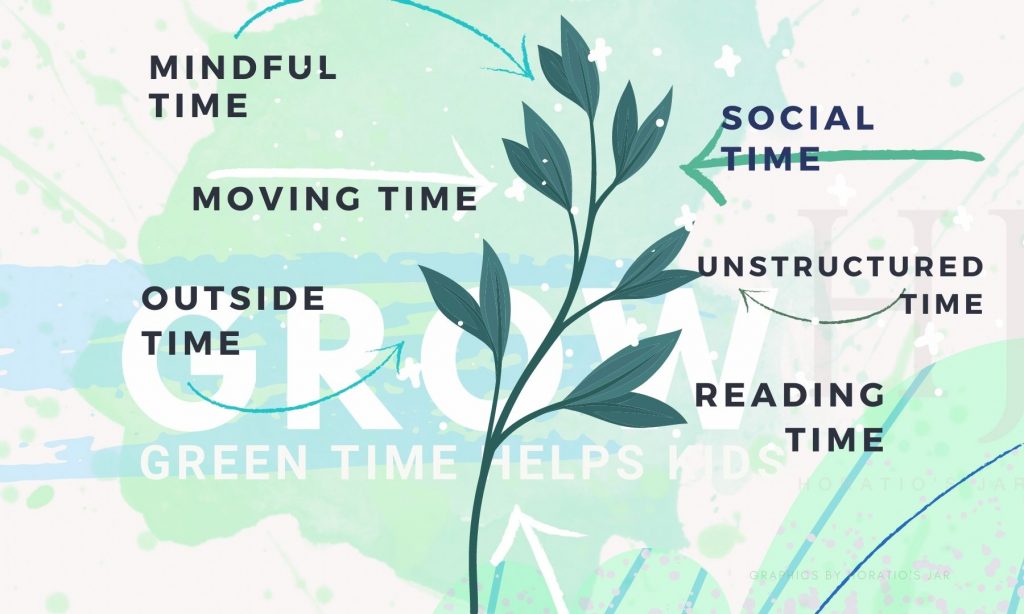Published by: Digital Schools
Screen Time: Let’s Introduce Green Time!
In this challenging time of parenting in a digital world, parents want to ensure their children are healthy, but many feel overwhelmed about exactly what this means. With regard to how much screen time children should have, I explain to parents that there is no magical number of hours deemed ‘healthy’ BUT I do encourage parents to introduce a concept of ‘green time’ alongside screen time.
Our job as parents is to prepare our children to be able to thrive in a digital world. Aside from keeping them safe online and ensuring they are accessing quality, age-appropriate content, we need to support them in developing healthy habits – balancing screen time with ‘green time’. It is ideal for all children to understand the importance of ‘green time’ just as they grow to understand why brushing their teeth and eating vegetables needs to be a part of daily life! All elements of ‘green time’ have a mountain of evidence supporting their critical role in supporting the healthy growth and development of our children and young people.
“Brush your teeth, eat your veggies and get plenty of green time!
So what do I mean when I say ‘green time’??

Download Your Free Guide Here
https://www.informandempower.com.au/freeresources
- Outside time – refers to traditional green time engaging in any activity outside in the natural world. This has such a restorative effect on our brains.
- Moving time – any activity where our children move their bodies (online exercise session, bike ride, trampoline, hopscotch etc.)
- Mindful time – this may mean listening to a meditation story or simply searching “Mindful activities for children”, and you will find a plethora of simple ideas depending on the age of your children.
- Social time – is absolutely anything that involves them connecting and engaging with others. Examples throughout a week may include playdates, team sports, dance and even time spent with siblings. The social skills that are developed from these face to face experiences are essential for our young people.
- Unstructured time – (children may call this ‘boring’ time!) refers to when you say “off you go and find something to do, no screens!”. Children typically complain, and then after that, their brain’s natural capacity to be creative and explore is activated, and yes, they find something to do!! Children experiencing ‘boredom’ is significant for their development.
- Reading time – this doesn’t just mean encouraging your child to read a traditional book. It may mean them reading a magazine, a recipe while cooking or even reading signs when you are out walking.
- ‘Green time’ in my household (three children aged 9, 13 and 15) is a well-known concept. When I asked one of my children to come inside to set the table for dinner recently, he answered back with, “I can’t, I’m getting my green time” (aka shooting basketball hoops with his brother!)… hard to be too cross about that response!!
![]()
Guest Contributor: Carley McGauran & Martin McGauran
Business Name: Inform & Empower
Publisher: Digital Schools
Carley McGauran (renowned as the ‘practical parent psychologist’) together with Martin McGauran (experienced primary school teacher and consultant) founded Inform & Empower. They promote healthy school communities through incursions, teacher professional learning and parent education on a range of topics including cyber safety, wellbeing and readiness for school. For more information visit www.informandempower.com.au
——-
PUBLISHER’S DISCLAIMER: The publisher of this blog post (Digital Schools PTY LTD) works in partnership with the school as a 3rd party provider to help build and maintain the school website. Digital Schools sources a range of experts who provide products and/or services to educational institutions and we work with them to produce and publish topical information in the form of blog posts that we think may be relevant, interesting or topical to families within the community. The views, opinions and content listed in this blog post are that of the guest contributor and/or publisher (Digital Schools). It should be noted that whilst the publisher and guest contributors are acting with the best intentions and in the best interests of the school and their community to provide helpful or interesting information, sometimes the content may not necessarily reflect the views of the school.
The information in this blog post is not meant to be used, nor should it be used, to diagnose or treat any medical condition. For diagnosis or treatment of any medical problem, consult your own physician. The school and the publisher of this blog post are not responsible for any person reading or following the information in this article who may experience adverse effects.
Any references to external websites or sources are provided for informational purposes only and do not constitute an endorsement by the school or publisher in any way and the publisher and/or school cannot guarantee the accuracy of the information listed.
If you have feedback on any content on this platform, you can submit it to the publisher using the feedback link provided at the bottom of this page.


